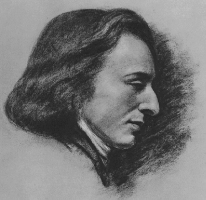
Frederic Chopin

(1810-1849)
One of the most
profoundly original composers in history, Frederic Chopin was not
at all a traditional "Romantic" musician; in fact, most
of his music defines a separate category all its own. Born in
Warsaw, Poland on February 22, 1810, Chopin first studied the
piano at the Warsaw School of Music, and was quite proficient on
that instrument by his early teens. He played his first public
concert at age 7, and was a published composer at 15.
By the late 1820s, Chopin had won a great reputation as a piano
virtuoso and composer of piano pieces. He toured Europe, giving
concert performances for ecstatic audiences and critics. In 1831
he arrived in Paris for such a concert; so immediate was his love
for this city that he promptly decided to make it his new home.
He was never to return to Warsaw.
In Paris, Chopin was in constant demand as a performer and
teacher. He was a favorite at Parisian salons, and was befriended
by many artistic luminaries of the day, including Hugo, Balzac,
Liszt, Berlioz, Schumann, Dumas and Delacroix. The intense
poeticism in his music made him a Romantic icon to many of his
contemporaries, and he was embraced by the society elite.
In 1837, Chopin met the novelist Mme. Aurore Dudevant, who used
the pseudonym George Sand. The two began a mercurial and
ultimately tragic relationship which would prove the most
influential and devastating development in Chopin's life. By
1847, their relationship at fallen apart. Heartbroken over the
loss of his beloved, Chopin continued to compose, but was soon
stricken by illness. Sapped by tuberculosis, he grew too sick to
work, and suddenly died on October 17, 1849, at the age of only
39.
Chopin's music, no matter what the setting, is instantly
recognizable. His unique sense of lyricism and unparalleled
melodic genius produced some of the most purely beautiful music
ever written - music which would influence many composers who
followed, from Brahms to Debussy. His works tend to fall into one
of three categories - small "technical" pieces (or
études) for piano, published between 1833 and 1837; larger, more
developed works for the piano (nocturnes, preludes, impromptus,
mazurkas, polonaises); and the even larger, freely-conceived
works (ballades, fanatasies, scherzos). He also wrote several
sonatas, piano concertos, and a smattering of music for other
instruments. He was a revolutionary light in Romantic music, the
ultimate craftsman of whimsical melody and heart-rending harmony.
In the structure and form of his compositions, he is quite alone;
his sense of balance and architecture in music was not
particularly related to the Classical or budding Romantic
tradition, but seemed to spring from some unknown well-source.
The overwhelming power and influence of his musical legacy is
forever assured.